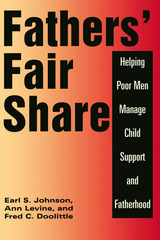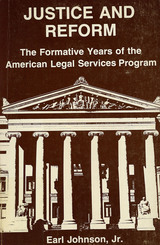2 books by Johnson, Earl

Fathers' Fair Share
Helping Poor Men Manage Child Support and Fatherhood
Earl S. Johnson
Russell Sage Foundation, 1999
One of the most challenging goals for welfare reformers has been improving the collection of child support payments from noncustodial parents, usually fathers. Often vilified as deadbeats who have dropped out of their children's lives, these fathers have been the target of largely punitive enforcement policies that give little consideration to the complex circumstances of these men's lives. Fathers' Fair Share presents an alternative to these measures with an in-depth study of the Parents Fair Share Program. A multi-state intervention run by the Manpower Demonstration Research Corporation, the program was designed to better the life skills of nonpaying fathers with children on public assistance, in the belief that this would encourage them to improve their level of child support. The men chosen for the program frequently lived on the margins of society. Chronically unemployed or underemployed, undereducated, and often earning their money on the streets, they bore the scars of drug or alcohol abuse, troubled family lives, and arrest records. Among those of African American and Hispanic descent, many felt a deep-rooted distrust of the mainstream economy. The Parents Fair Share Program offered these men the chance not only to learn the social skills needed for stable employment but to participate in discussions about personal difficulties, racism, and problems in their relationships with their children and families. Fathers' Fair Share details the program's mix of employment training services, peer support groups, and formal mediation of disputes between custodial and noncustodial parents. Equally important, the authors explore the effect of the participating fathers' expectations and doubts about the program, which were colored by their often negative views about the child support and family law system. The voices heard in Fathers' Fair Share provides a rare look into the lives of low-income fathers and how they think about their struggles and prospects, their experiences in the workplace, and their responsibilities toward their families. Parents Fair Share demonstrated that, in spite of their limited resources, these men are more likely to make stronger efforts to improve support payments and to become greater participants in their children's lives if they encounter a less adversarial and arbitrary enforcement system. Fathers' Fair Share offers a valuable resource to the design of social welfare programs seeking to reach out to this little-understood population, and addresses issues of tremendous importance for those concerned about welfare reform, child support enforcement, family law, and employment policy.
[more]

Justice and Reform
The Formative Years of the OEO Legal Services Program
Earl Johnson
Russell Sage Foundation, 1974
Justice and Reform is the first study of the origins, philosophy, creation, management, and impact of the Office of Economic Opportunity Legal Services Program. As such, it clearly and concisely describes the Program's role both as an instrument of equal justice and as a strategy for overcoming poverty. Timely, important, and unique, it tells the story behind the OEO Legal Services Program—an endeavor that has been called both the most successful element of the war on poverty and the most stimulating development to occur in the American legal profession during the Twentieth Century. The early chapters in the book reveal the nature and motivations of the two groups which joined to create the Program: the conservative, American Bar Association sponsored 89-year-old legal aid movement and the Ford Foundation-financed neighborhood lawyer experiments that started in 1962 under the direction of young activist lawyers. Why they merged and how they merged forms the background for a description of how the partners persuaded the OEO bureaucracy to start a legal services program and convinced over 200 communities (including most large cities) to set up a federally funded legal assistance agency. Legal Services Program established policy, how it settled upon "law reform" as the priority function of the Program, how it preserved the integrity of its policies within OEO, and how it caused its grantees to engage in law reform. Chapter 8 evaluates, for the first time, the economic, political, and social impact of the Program as of 1972. The final chapter speculates on the future of government-subsidized legal assistance in the United States from the perspective of the OEO program's twin goals of equal justice and social reform.
[more]
READERS
Browse our collection.
PUBLISHERS
See BiblioVault's publisher services.
STUDENT SERVICES
Files for college accessibility offices.
UChicago Accessibility Resources
home | accessibility | search | about | contact us
BiblioVault ® 2001 - 2024
The University of Chicago Press









